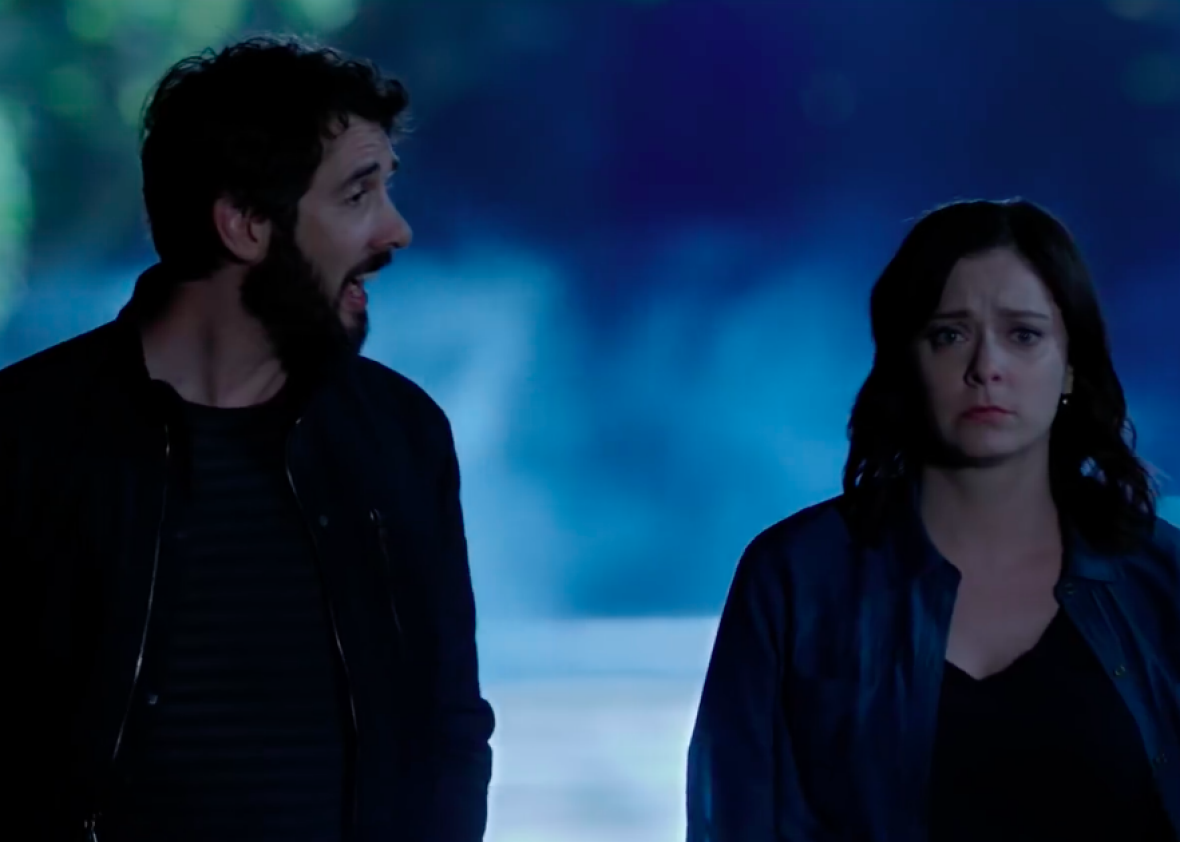I can’t stop thinking about Josh Groban. In that, I am like the people who have purchased 20 million copies of his albums and are probably listening to Noël, his frictionless 2007 collection of traditional Christmas songs, at this very moment. But what possesses my mind right now, what I find myself pondering in idle moments during an otherwise busy day, is how bad Josh Groban is—and how good he is at being bad.
I’m not talking about Groban’s famously mellifluous baritone, which has enchanted listeners since he graced Ally McBeal with a serenade in 2001. It’s a gorgeous voice, especially if you don’t care much for taste or restraint. No, it’s Groban’s skills, or lack of skills, as an actor that preoccupy me. Last week, Groban showed up on Crazy Ex-Girlfriend to give the show’s protagonist a musical lesson in the difference between constructed narratives and real life, and his appearance at the end of an unusually somber episode was like a well-timed joke at a funeral, a respite all the more welcome for the gloom that preceded it.
What makes Groban’s cameo a special delight is how little Crazy Ex-’s Rebecca Bunch seems to care about it. In a depressive funk as she walks mechanically down a darkened street, she’s oblivious as Groban sings about what you take to be the movie of your life, “Sometimes you’re a star, and sometimes you’re an extra.” Groban has been an invisible presence up to this point in the song, a disembodied if not especially omniscient voice, but as he gets to the word “extra,” he steps out from between two parked cars and makes a sweeping hand gesture, belting out, “Just walking by in the background—like me, Josh Groban!” Rebecca doesn’t even notice.
As Rebecca keeps walking, Groban falls into step alongside her, and his movements grow ever more emphatic. He breaks out the jazz hands, and his eyebrows shoot to the top of his forehead, selling every line with a sincerity so emphatic it tilts over into fraudulence. It’s the kind of performance you might expect a recent theater grad to give their first day on a film set when they’re still acting for the back row instead of the camera a few feet from their face. It’s embarrassingly bad, but it’s also perfect.
If you’ve seen Groban play it relatively straight, like as Emma Stone’s jerky boyfriend in Crazy Stupid Love, you know he’s a limited actor at best, but he can be tremendously charismatic when he’s playing or, in this case, parodying himself. “Me, Josh Groban!” is Crazy Ex-Girlfriend’s sendup of Groban’s blandly likable public persona, a self-styled nice guy honing in on a woman’s grief and dispensing tepid insights with the grandiosity of a descending Moses. Life isn’t a movie? Yeah, dude, thanks for that.
Groban’s Crazy Ex-Girlfriend number brought me back to his turn in the now-closed Broadway musical Natasha, Pierre & the Great Comet of 1812, in which he played a Russian aristocrat in the premature twilight of his life, resigned to his own mediocrity and an existence enlivened only by the vicarious pleasures of other, braver men. The Great Comet’s composer, Dave Malloy, played the part during its early incarnations, but the transfer to Broadway required a bigger name, and Groban, who aimed to study musical theater before his singing career took off, expressed interest in playing Pierre, a performance which eventually got him a Tony nomination.
Malloy wrote the part for himself, a leading role for a performer you wouldn’t normally think of as a lead, and if you’d seen Malloy onstage, Groban might have seemed like an unfathomably strange replacement for the stout, passive, middle-aged Pierre. In the Broadway production, Groban’s synthetic paunch and broad gestures gave him the feeling of a child with a pillow strapped to his chest, awkwardly pacing the stage as more practiced performers twirled around him. But that very ungainliness became part of the character, rather than a distraction from it. Groban felt out of place on the stage just as Pierre did in the world. And when he sang, sometimes to others but often to himself, you felt the aching distance between who Pierre was on the outside—a cuckold, a washout, a schmuck—and who he felt he could be.
The Great Comet breaks from its through-sung format only once, when the disgraced and suicidal Natasha is at her lowest point and Pierre reaches out with the most passionate offering he can muster. (Spoilers for a musical that debuted in 2012 follow.) “If I were not myself, but the brightest, handsomest, best man on Earth,” he says in a voice choked with emotion and still sheepishly restrained, “I would get down on my knees and ask for your hand and your love.” The greatest thing he can offer her is a hypothetical couched in the premise that he is more than he could ever be.
Readers of Tolstoy’s War and Peace, of which The Great Comet adapts only a sliver, know that Pierre and Natasha do end up married, but the musical ends with them in limbo and Pierre gazing at a celestial object that both terrifies and awes him, showing him that the world he has thus far known is not all there is. If only Groban could have sung that song to Rebecca Bunch as well.
